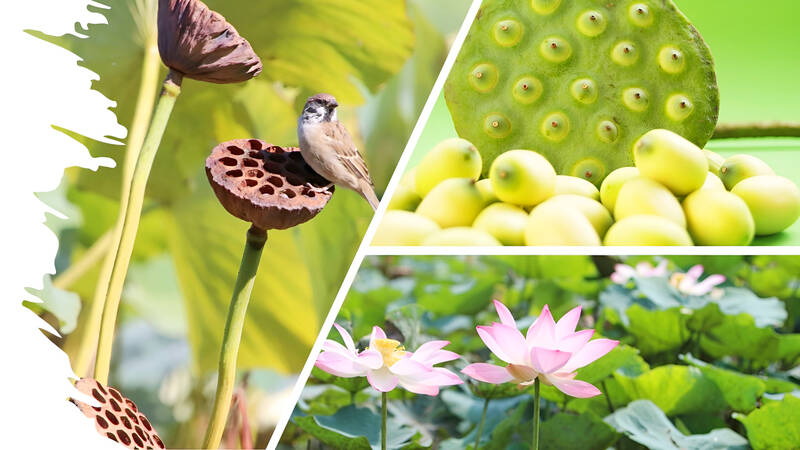對話 Dialogue
清清:華華,週末你不是跟家人去台南參加白河蓮花季的活動嗎?覺得怎麼樣?
Qīngqing: Huáhua, zhōumò nǐ búshì gēn jiārén qù Táinán cānjiā Báihé Liánhuājì de huódòng ma? Juéde zěnmeyàng?

華華:不錯啊!蓮花都開得好美,我爸還買了一些蓮子回來,想自己煮蓮子粥吃。
Huáhua: Búcuò a! Liánhuā dōu kāi de hǎo měi, wǒ bà hái mǎile yìxiē liánzǐ huílái, xiǎng zìjǐ zhǔ liánzǐzhōu chī.
清清:蓮子是好東西,有時候吃一點,對身體有好處,別吃太多就好。
Qīngqing: Liánzǐ shì hǎo dōngxi, yǒushíhòu chī yìdiǎn, duì shēntǐ yǒu hǎochù, bié chī tài duō jiù hǎo.
華華:去現場看過才知道,古人為什麼那麼推崇蓮花,真的是清新脫俗,高雅極了!
Huáhua: Qù xiànchǎng kànguò cái zhīdào, gǔrén wèishénme nàme tuīchóng liánhuā, zhēnde shì qīngxīn tuōsú, gāoyǎ jíle!
清清:是啊!所以才會在我們的文化佔著重要的地位,以前的人還很愛用「蓮」來取名字呢!都是對孩子或自己在人品上的期望。
Qīngqing: Shì a! Suǒyǐ cái huì zài wǒmen de wénhuà zhànzhe zhòngyào de dìwèi, yǐqián de rén hái hěn ài yòng “lián” lái qǔ míngzi ne! Dōu shì duì háizi huò zìjǐ zài rénpǐn shàng de qíwàng.
華華:不僅如此,因為臺灣有很多佛教徒,而佛教也很推崇蓮花,因此跟佛教
相關的,也常常都能看見蓮花的圖案。
Huáhua: Bùjǐn rúcǐ, yīnwèi Táiwān yǒu hěnduō Fójiào tú, ér Fójiào yě hěn tuīchóng liánhuā, yīncǐ gēn Fójiào xiāngguān de, yě chángcháng dōu néng kànjiàn liánhuā de tú’àn.
清清:嗯!說了半天,我也想去賞蓮,能不能推薦我比較好的交通方式?
Qīngqing: En! Shuōle bàntiān, wǒ yě xiǎng qù shǎng lián, néng bùnéng tuījiàn wǒ bǐjiào hǎo de jiāotōng fāngshì?
華華:當然是自己開車最方便,要不然得先坐高鐵,到嘉義站下車,再坐接駁車到嘉義火車站,從那裡坐公車到白河。直接坐火車到新營或後壁,然後搭客運到白河也是一樣,你自己看要怎麼去囉!
Huáhua: Dāngrán shì zìjǐ kāichē zuì fāngbiàn, yàobùrán děi xiān zuò gāotiě, dào Jiāyì zhàn xiàchē, zài zuò jiēbóchē dào Jiāyì Huǒchēzhàn, cóng nàlǐ zuò gōngchē dào Báihé. Zhíjiē zuò huǒchē dào Xīnyíng huò Hòubì, ránhòu dā kèyùn dào Báihé yěshì yíyàng, nǐ zìjǐ kàn yào zěnme qù luo!
翻譯 Translation
Qingqing: Huahua, weren’t you going to Tainan with your family to attend the Baihe Lotus Festival this weekend? How was it?
Huahua: It was great. The lotus flowers were so beautiful. My dad even bought some lotus seeds and wants to make lotus seed porridge at home.
Qingqing: Lotus seeds are indeed good for you, when consumed in moderation. Don’t overindulge.
Huahua: Seeing them in person really made me understand why ancient people revered lotus flowers so much. They are truly elegant and exude a sense of purity.
Qingqing: Yes. That’s why lotus flowers hold such an important place in our culture. People used to love giving names with “lotus” in them, expressing hopes for good character traits for their children or themselves.
Huahua: Not only that, because Taiwan has many Buddhists, and Buddhism also regards lotus flowers highly. Therefore, anything related to Buddhism often features lotus flower patterns.
Qingqing: Hmm. After all that talk, I also want to go see the lotus flowers. Can you recommend the best way to get there?
Huahua: Of course, driving yourself is the most convenient. Otherwise, you can take the high-speed rail to Chiayi Station, then transfer to the shuttle bus to Chiayi Train Station, and from there take a bus to Baihe. Alternatively, taking the train to Xinying or Houbi and then catching a bus to Baihe is also an option. It’s up to you how you want to get there.
生詞 Vocabulary
1. 蓮花 (liánhuā) lotus
2. 蓮子 (liánzǐ) lotus seed
3. 推崇 (tuīchóng) admire, revere
4. 清新脫俗 (qīngxīn tuōsú) [phrase] fresh and elegant
5. 高雅 (gāoyǎ) elegant, graceful
6. 人品 (rénpǐn) character, moral quality, moral standing
7. 佛教徒 (Fójiào tú) Buddhists
8. 圖案 (tú’àn) pattern, design
教材音檔 Audio Files
國立清華大學華語中心提供
By National Tsing Hua University Chinese Language Center:

A: When is the Lantern Festival? B: The festival is celebrated on the 15th day of the first month of the lunar calendar, which fell on Feb. 12 this year. A: Oh no! Did I miss the 2025 Taipei Lantern Festival? B: Yes, you did. But you can still go to the 2025 Taiwan Lantern Festival in Taoyuan, which will run until this Sunday. A: Let’s go admire the exuberant lanterns. A: 元宵節到底是哪一天? B: 就是農曆1月15日啊,今年則落在國曆2月12日。 A: 喔不,我是不是錯過了2025台北燈節? B: 是的,但你還可以去桃園的2025台灣燈會,活動將持續至週日。 A: 那我們去欣賞豐富的花燈秀吧! (By Eddy Chang, Taipei Times/台北時報張聖恩)

A: What’s the theme of the 2025 Taiwan Lantern Festival’s main lantern? B: The theme is “Paradise,” and the main lantern is a snake-shaped “infinity” symbol that features a lighting show every half an hour. A: Cool, I heard that there are over 300 lanterns. B: There are even giant lanterns in the shape of Pikachu and some other popular Pokemon characters. A: Let’s go now. A: 2025台灣燈會主燈的主題是什麼? B: 主題是「無限樂園」!主燈的造型則是蛇形的數學「無限號」,主燈每半小時還有一次燈光秀。 A: 酷喔,聽說總共有300多件花燈作品。 B: 甚至還有皮卡丘和其他熱門寶可夢角色的巨型花燈呢。 A: 哇我們現在就出發吧! (By Eddy Chang, Taipei Times/台北時報張聖恩)

本文由生成式AI協作,本刊編輯編修。 Tucked away in southwestern Taiwan, Yunlin County is a treasure trove of cultural heritage, rich history, and natural beauty. From its stunning temples and glove puppetry to historical architecture and picturesque landscapes, Yunlin rewards those who venture off the beaten path. Yunlin is renowned for its flourishing temple culture. Temples in this region are not merely places of worship but also communal centers where people gather for festivals, rituals, and social functions. One of the most notable temples here is the Beigang Chaotian Temple, which was built more than 300 years ago and is dedicated to Matsu, the sea

After steel and aluminum, US President Donald Trump has set his sights on slapping 25 percent tariffs on semiconductors, cars and pharmaceuticals. Trump has already slapped additional 10 percent tariffs on goods from China and has also threatened tariffs on Canada and Mexico, plus ordered a study into putting into place reciprocal tariffs. Here’s a look who would be hit the hardest if US import tariffs on semiconductors, cars and pharmaceuticals go into force. SEMICONDUCTORS: ASIA IN THE CROSSHAIRS Semiconductors, or microchips, are the brains in our electronic devices and demand has soared with the development of AI, which